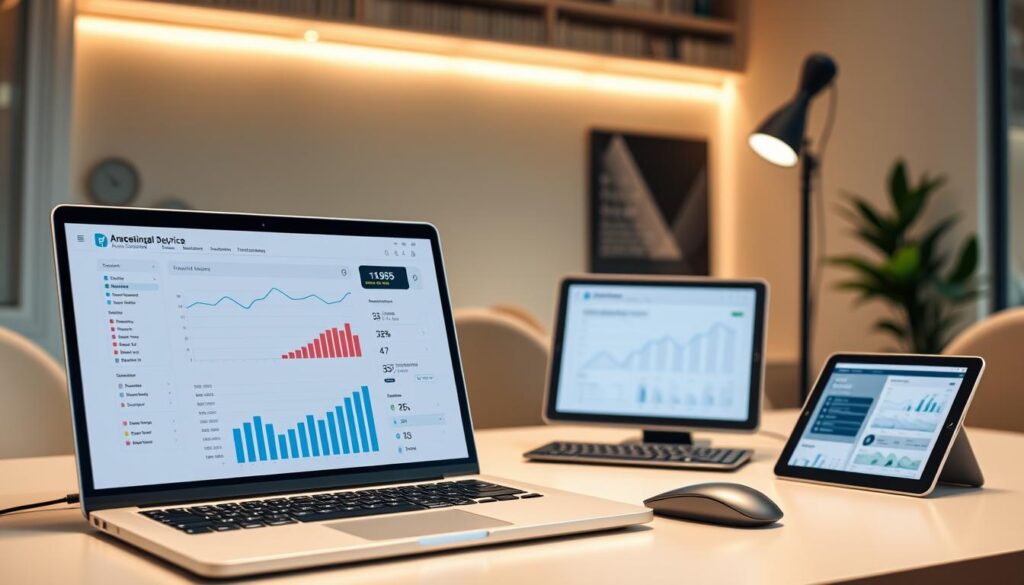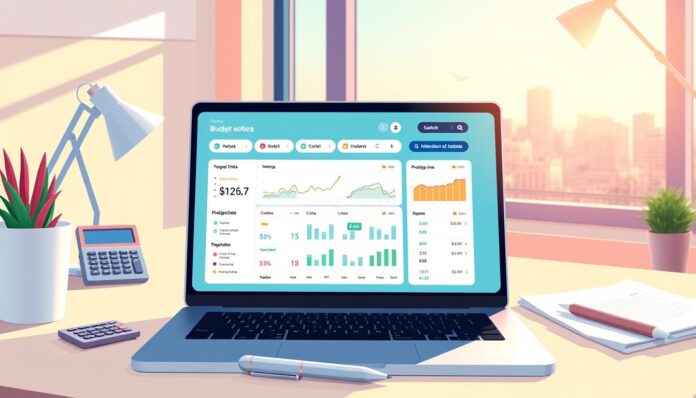In the ever-evolving landscape of personal finance management, the quest for simplicity remains at the forefront. With an array of financial planning tools at your fingertips, the promise of streamlined money management is more accessible than ever before. Embracing modern online budgeting tools provides not just convenience but a structured pathway to better financial health. These digital money management tools offer a clear view of your finances, equipping you with the insights needed to make smart decisions with confidence. Dive into the world of budgeting tools and unravel how these digital wizards work tirelessly behind the scenes to arrange your financial life into a clear, easy-to-navigate picture.
Key Takeaways
- Understanding the transformative role of budgeting tools in personal finance.
- Recognizing the importance of online budgeting tools for financial clarity.
- Assessing how financial planning tools offer actionable insights leading to fiscal health.
- Learning to navigate the features of diverse money management tools available.
- Discovering the impact of an organized financial plan on overall success and stability.
What are Budgeting Tools and Why You Need Them
Understanding the essentials of budgeting tools begins with recognizing their role in simplifying personal finance management. With the influx of personal finance apps and budget trackers, users can now consolidate all their financial data in a single, easy-to-access platform. This integration allows for a transparent overview of income, expenditures, and spending behaviors, which is crucial in making informed financial decisions.
The foundational purpose of using a budget tracker is to facilitate a clear path towards financial clarity and goal achievement without the complexities of traditional budgeting methods. Whether it’s planning for a vacation, saving for retirement, or managing daily expenses, these tools equip you with the relevant functionalities to meet your monetary objectives.
Understanding Budgeting Tools
Personal finance apps not only simplify the process of budgeting but also provide critical insights into your financial habits. By centralizing transactions and financial accounts, these applications offer a comprehensive analysis of where money comes from and where it goes, making it easier to spot trends and adjust accordingly.
Benefits of Using Budgeting Tools
The perks of utilizing efficient budgeting tools extend beyond mere tracking. They are instrumental in setting realistic budgets, facilitating real-time tracking of expenses, and assisting in long-term financial goal setting. By providing detailed reports and analytics, budget trackers empower users to refine their spending patterns and optimize savings. Moreover, their ability to generate instant financial reports simplifies the task of understanding complex financial data, thereby aiding in making quick yet effective financial decisions.
For more insights on securing digital assets using similar technology-driven solutions, consider exploring how to secure your Pi coins, which highlights the effectiveness of advanced security measures like two-factor authentication and regular software updates in the realm of digital finance.
Top Free Budgeting Tools to Consider
In the landscape of personal finance apps and expense tracking apps, identifying effective, cost-free solutions can vastly improve your financial management strategies. This section explores three pivotal tools that any budget-conscious individual should consider.
Mint: A Comprehensive Budgeting Solution
Mint stands out in the crowd of personal finance apps by offering a robust suite of features that cater to comprehensive budget management. From automatically categorizing transactions to setting up customizable budgets, Mint helps you keep a vigilant eye on your finances. Furthermore, users can benefit from free updates on their credit score, making it a multifaceted tool in the arsenal of expense tracking.
Personal Capital: Investment Tracking Made Easy
For those specifically focused on fortifying their investment portfolio, Personal Capital offers a clear edge. This app not only provides detailed visualizations of your investments but also integrates retirement planning advice — a crucial component for long-term financial stability. It bridges the convenience of personal finance tools with sophisticated investment tracking capabilities.
EveryDollar: User-Friendly Budgeting
EveryDollar appeals to individuals seeking a straightforward and intuitive user interface. Quickly set up monthly budgets, track your expenses against them, and adjust in real-time. It simplifies the experience without compromising on the detailed insight needed to manage personal finances efficiently.
| Feature | Mint | Personal Capital | EveryDollar |
|---|---|---|---|
| Expense Tracking | Automatic categorization | Manual input with visual insights | Manual input with quick tracking |
| Budget Customization | Highly customizable | Limited | Simple and intuitive |
| Investment Assistance | Basic tracking | Advanced tools with advisory services | None |
| Add-on Features | Credit score updates | Retirement planning | Budget sync across devices |
Choosing among these personal finance apps and expense tracking apps depends on individual needs like investment tracking, ease of budget creation, or a desire for comprehensive financial oversight. Each tool offers unique benefits tailored to enhance your personal financial landscape.
Best Paid Budgeting Tools for Serious Planners
When your financial planning needs surpass basic capabilities, turning to paid budgeting software can dramatically improve your ability to manage finances with precision. These sophisticated tools not only assist with routine expense tracking but also offer features tailored for deep financial analysis and proactive planning.

YNAB (You Need A Budget) is renowned for its rigorous approach to budget management. It encourages users to give every dollar a role, promoting a sense of financial accountability essential for goal achievement. Its method ensures that every aspect of your financial life is consciously funded, reducing frivolous spending and maximizing savings efforts.
Simplifi by Quicken stands out due to its comprehensive feature set, which includes detailed forecasting and customized alerts, making it a top choice for users who desire a nuanced overview of their financial future. This platform is particularly effective for those who have diverse income streams and complex financial portfolios that benefit from granular management.
GoodBudget takes the timeless envelope budgeting method and updates it for the digital era, making it ideal for users who prefer a tactile approach to budgeting. This app allows you to allocate funds to different “envelopes” every month, ensuring that spending limits are respected and financial planning stays on track.
Each of these tools provides robust platforms for everything from simple expense tracking to sophisticated financial planning, making them essential for anyone serious about managing their personal finances. Integrating powerful budgeting software into your routine can transform the way you view and handle your money, setting the stage for increased financial stability and growth.
How to Choose the Right Budgeting Tool for You
Choosing the right budgeting tool can significantly enhance your financial management strategy. Whether you’re balancing your monthly expenses, tracking investments, or planning for future financial milestones, the right tool can make all the difference. Proper evaluation of your specific needs in terms of money management tools is crucial to finding a solution that fits like a glove.
Here are critical areas to address when searching for the best online budgeting tools:
Assessing Your Financial Goals
Determining what you hope to achieve with your budget will guide you in selecting the appropriate features you need from a tool. If you are looking to track day-to-day spending, a basic tool might suffice. However, for more complex financial planning like investment tracking or retirement planning, look for money management tools that offer advanced functionalities.
Evaluating User-Friendliness
The best online budgeting tools not only pack powerful features but are also easy to navigate. Ensuring the tool you choose aligns with your technology comfort level will enhance your interaction and regular use of the application, making your financial tracking stress-free.
Considering Features vs. Price
While some premium online budgeting tools offer extensive features, they come at a cost. Decide on a budget for such tools and assess whether the features offered justify the expense. Remember, effective financial management is about cutting unnecessary costs, not adding to them.
Tips for Effectively Using Budgeting Tools
Mastering the use of budgeting tools requires a mix of strategy and discipline to enhance your personal financial management. By following several key practices, you can utilize budget tracker functionalities and personal finance apps to stay on top of your financial health.
Initially, Setting Up Your Budget Carefully is critical. It’s important to capture all income sources and known expenses accurately to avoid discrepancies which can cause stress and confusion later. Effective budgeting tools help in detailing these entries and can remind you of periodic expenses that might slip your mind otherwise.
Up next is Regularly Updating Your Financials. As your financial situation evolves, it’s pivotal to reflect these changes in your budget tracker. Whether it’s a change in salary, unexpected expenses, or financial windfalls, keeping your budget updated helps in maintaining accuracy and provides a clear picture of your financial journey.
Lastly, Staying Disciplined with Spending is often easier said than done. Personal finance apps can aid significantly in this area by sending alerts and generating reports based on your spending patterns. These tools offer insights into where your money is going and highlight areas where you might need to cut back to stay aligned with your financial goals.
By adopting these practices, users can ensure they are maximizing the potential of their budgeting tools, keeping their finances structured and clear, and moving towards their economic objectives with confidence and control.
Common Mistakes to Avoid When Budgeting
Budgeting is an essential process for achieving financial stability and meeting long-term goals. However, several common errors can undermine the effectiveness of your budgeting efforts. Being aware of these pitfalls and using reliable financial planning tools and money management tools can significantly enhance your financial management strategy.
Overcomplicating Your Budget
One frequent misstep is overcomplicating the budgeting process. This often results from trying to track too many categories or using overly complex money management tools. Simplicity is key. A straightforward budget is easier to follow and adjust when necessary, increasing the likelihood of sticking to your financial plan.
Ignoring Unexpected Expenses
Failure to account for unexpected expenses is another critical error. Life is unpredictable, and without provisions for sudden financial demands, you can quickly find yourself off track. Effective financial planning tools help you set aside a contingency fund that can be accessed for such instances.
Failing to Review and Adjust Your Budget
Regularly revisiting your budget is vital. Economic circumstances and personal financial situations change, and your budget should reflect these modifications. By not reviewing and adjusting your budget, you might miss opportunities to optimize your savings or reduce unnecessary spending.

By addressing these common mistakes using solid financial planning strategies, you ensure a smoother and more successful journey toward financial freedom. Leveraging high-quality money management tools simplifies this process, helping you maintain a clear overview of your financial health.
Integrating Budgeting Tools with Other Financial Apps
As the financial landscape evolves, the integration of budgeting tools with other financial applications becomes essential for anyone looking to streamline their financial management. This synergy allows users to manage their finances with heightened efficiency and clarity, consolidating their financial activities into a cohesive system.
Combining budgeting tools with banking apps not only facilitates seamless fund transfers but also ensures that all financial data is updated in real-time. This helps in maintaining a continuous and integrated view of financial health. Similarly, syncing these tools with investment platforms enables users to monitor investments alongside daily expenses, aligning with broader financial planning tools.
Let’s delve into some specific improvements achievable through these integrations:
- Immediate transfer of funds between accounts, which is vital for maintaining liquidity and managing emergency needs without disruption.
- Automated updates of spending in budgeting tools when linked with banking applications, reducing manual entry errors.
- Enhanced visibility into investment growth directly from budgeting dashboards, making it simpler to make informed financial decisions.
This interconnected approach offers an enhanced, data-driven method for managing personal finances, highlighting the importance of integrated financial planning tools in today’s digital era.
Real-Life Success Stories with Budgeting Tools
The effectiveness of budgeting software and personal finance apps isn’t just measured in features and interfaces; it’s profoundly reflected in the real victories of everyday people. These digital tools have enabled various individuals and families to master their finances with remarkable outcomes. Here’s a look into how different demographics are harnessing the power of these tools to achieve financial success.
Families utilizing budgeting software see tangible results by setting and hitting major financial milestones such as home ownership and educational funding. This form of financial guidance helps in crafting a disciplined spending and saving routine, ensuring all monetary goals are attainable.
Young Professionals often turn to personal finance apps to navigate the complexities of building wealth. By tracking their spending, investments, and savings, these apps empower them to optimize their financial growth and accelerate their achievements.
Stories of individuals tackling debt are especially compelling. With the strategic use of budgeting tools, countless users have been able to devise and stick to rigorous debt repayment schedules, successfully clearing their debts and improving their financial health.
| Demographic | Goals | Tool Used | Outcome |
|---|---|---|---|
| Families | Save for home, children’s education | Budgeting Software | Achieved set targets within 5 years |
| Young Professionals | Wealth building, investment tracking | Personal Finance Apps | Increase in investment returns by 20% |
| Individuals | Debt Repayment | Budgeting Tools | Debt-free within 3-4 years |
These success stories serve as proof that when effectively utilized, budgeting software and personal finance apps can be game changers in managing personal finances. They not only provide the framework for individuals to tackle immediate financial issues but also foster long-term financial health and wealth creation.
Future Trends in Budgeting Tools
The financial technology sector is rapidly evolving, and so are the tools it offers for budget management. As we keep an eye on the horizon, it’s becoming clear that the future of online budgeting tools and money management tools is leaning heavily into cutting-edge technology tailored to consumer behavior. Users seeking efficient and smart options for managing their hard-earned money will find the next generation of budgeting applications more intuitive and interconnected than ever before.
The Rise of AI-Powered Budgeting
Artificial Intelligence (AI) is redefining personal finance with advanced online budgeting tools that offer much more than simple expense tracking. These AI-powered systems learn from your spending habits to provide personalized financial insights, making it easier to identify areas where you can save. By automating the categorization of expenses and predicting future spending, these tools simplify decision-making and help users strategize for financial stability and growth.
Mobile-First Solutions for On-the-Go Users
In our mobile-centric world, it’s unsurprising that mobile-first solutions for money management tools have become a priority. A mobile-first approach ensures that the core features of a budgeting app are designed to be accessed seamlessly on smartphones, empowering users to manage their finances anytime, anywhere. This trend caters especially to millennials and Gen Zers, who prefer handling their financial life via their mobile devices.
Community Features for Support and Advice
Lastly, the importance of community engagement in fintech cannot be overlooked. Modern budgeting tools are incorporating community features, allowing users to connect, share experiences, and offer each other support and advice. This added layer turns an individual’s journey of financial management into a collaborative experience, fostering a supportive environment where users can learn from others’ successes and challenges, ultimately enriching the personal finance journey.


